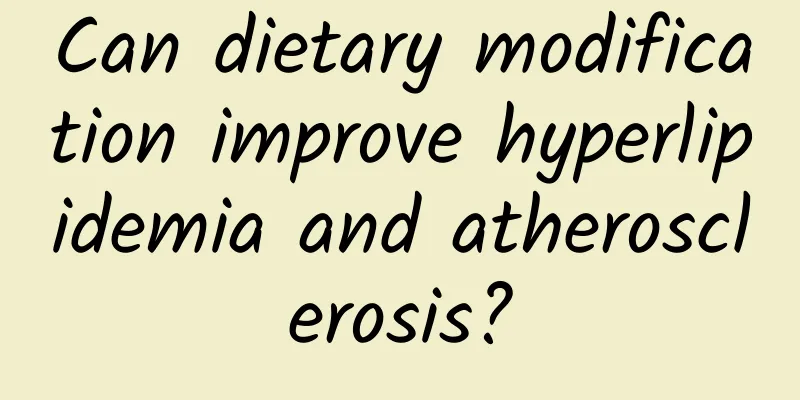Can dietary modification improve hyperlipidemia and atherosclerosis?

|
Author: Cui Yihui, registered dietitian, master of medicine Reviewer: Wang Junbo, Associate Professor and Doctoral Supervisor, Peking University Health Science Center When the triglycerides and cholesterol in the blood increase and exceed the normal value, it is called hyperlipidemia. Although patients with hyperlipidemia usually do not have subjective symptoms, it does not mean that these excess triglycerides and cholesterol will "honestly" "go with the flow" in the blood and not pose a threat to the human body. In fact, the biggest threat of hyperlipidemia to the human body is the well-known atherosclerosis. The human body's blood vessels are divided into three types: arteries, veins, and capillaries. Arteries transport oxygen and nutrients to organs, tissues, and cells throughout the body through blood. When atherosclerosis occurs in the body, it will affect important organs throughout the body and cause serious harm to the body. ●How does hyperlipidemia cause atherosclerosis? ➣When triglycerides and low-density lipoprotein cholesterol ("bad" cholesterol) increase, they will "crowd out" high-density lipoprotein cholesterol ("good" cholesterol), causing the latter to decrease in amount. ➣With less “good” cholesterol, the amount of excess cholesterol in the blood that is “recycled” decreases, so unrecycled cholesterol continues to remain in the blood. ➣These "idle" low-density lipoprotein cholesterols ("bad" cholesterol) are particularly susceptible to being "targeted" by reactive oxygen free radicals and oxidized by them, becoming peroxidized fats that attach to the walls of arterial blood vessels. ➣The body's immune system will treat the peroxidized fat as a "foreign body", so it will send out macrophages, which are responsible for cleaning up foreign bodies in the blood, to devour them. However, the macrophages themselves cannot directly eliminate these "foreign bodies", but can only "swallow" them until they can no longer "swallow" them and burst, and the macrophages and the "foreign bodies" perish together. ➣The ruptured "debris" continues to accumulate on the inner wall of the artery, and finally forms a "sticky" atherosclerotic substance. These atherosclerotic substances eventually cause the arterial wall to lose elasticity and harden. The above is the process of forming "atherosclerosis". ●What are the dangers of atherosclerosis? ➣If cerebral atherosclerosis occurs, blood circulation in the skull will be poor. Initial symptoms include dizziness, forgetfulness, and transient dizziness when standing. Transient cerebral ischemia may occur next. As the disease progresses, when blood clots form and block cerebral blood vessels, it will cause cerebral hemorrhage and cerebral infarction. (Copyrighted image from the gallery, no permission to reprint) ➣If coronary atherosclerosis occurs, it may cause angina pectoris and even worsen into myocardial infarction. ➣If the large arteries in the legs become hardened, the early symptoms are leg pain when walking, which makes it impossible to walk, and it can be relieved after a short rest. If the condition worsens, leg gangrene will occur, and it is not uncommon for amputation to occur. ➣If arteriosclerosis occurs at the fundus, it can lead to partial loss of visual field or even blindness. ➣If renal artery sclerosis occurs, it will lead to uremia. (Copyrighted image from the gallery, no permission to reprint) Nowadays, people eat better, move less, have more pressure and competition, and hyperlipidemia is no longer a "patent" of middle-aged and elderly people. Many people in their thirties are diagnosed with hyperlipidemia during physical examinations. If you have abnormal blood lipids at such a young age, coupled with high blood pressure and smoking, it would be strange if your arteries don't "harden" early! ●How to prevent and improve hyperlipidemia/atherosclerosis through diet? ➣ Low-density lipoprotein cholesterol attacked by reactive oxygen is the "culprit" of atherosclerosis. How to fight reactive oxygen and prevent low-density lipoprotein cholesterol from being oxidized? We should eat more foods with antioxidant effects, especially plant foods rich in nutrients such as vitamin C, vitamin E, carotenoids, and tea polyphenols. ➣ Foods rich in dietary fiber (vegetables, fruits, seaweed, etc.) can lower cholesterol and inhibit the intestinal absorption of triglycerides. ➣Eat bean products (such as soybeans) regularly. Soy protein can significantly reduce low-density lipoprotein cholesterol and increase high-density lipoprotein cholesterol. Soy contains saponin, which can reduce cholesterol and triglycerides. Soy isoflavones have physiological effects similar to estrogen, which can also reduce cholesterol and triglycerides, maintain smooth blood flow, and prevent thrombosis. ➣ Regularly eating foods rich in eicosapentaenoic acid (EPA) and docosahexaenoic acid (DHA), both of which are n-3 polyunsaturated fatty acids (seaweed foods, deep-sea fish, etc.), helps soften blood vessels, prevent thrombosis and improve high blood pressure. It is recommended that middle-aged and elderly friends often eat foods that help prevent thrombosis, such as black beans, natto, onions, tomatoes, broccoli, green tea (matcha powder), etc. |
<<: The "blood lipid" indicators on the physical examination report
>>: Identify the "bad guys" in the fat family - trans fatty acids
Recommend
How many months of pregnancy will your appetite increase?
During pregnancy, a woman's appetite will gra...
How long does it take for a pregnant woman to have her period after a caesarean section?
Some pregnant women do not have their periods for...
It’s the influenza season now. How can we prevent and respond to it scientifically?
It is currently the flu season. What are the symp...
What causes a swollen belly during pregnancy?
The process of pregnancy is a relatively long pro...
Will online classes shorten the summer vacation in 2020? Why do we need to take online classes if the summer vacation is shortened?
Do we need to make up for the summer vacation aft...
What color is a normal period?
Menstruation is a physiological phenomenon. The p...
Numbness in hands and feet during late pregnancy
In the later stages of pregnancy, as the baby gro...
When is the best time to take enzymes? Benefits of taking enzymes for women
Nowadays, urban women are under great work pressu...
What would happen if a woman didn't have a uterus?
The uterus is a very important organ in the femal...
Symptoms of nephritis in women
We all know the importance of kidneys to our huma...
What happens if an ovary ruptures? These reasons are most likely!
Some women have never had ovarian disease before ...
A woman dreams of washing her hair
What does it mean to dream about a woman washing ...
Should I drink motherwort before or after my period?
Many women are accustomed to using Motherwort Gra...
How long does it take to recover from a caesarean section?
The cesarean section method of delivery has gradu...
What to do if a pregnant woman has neck pain and cough
If pregnant women feel severe neck pain and have ...





![[Beijing CDC reminds you] What should you do if you have acute diarrhea?](/upload/images/67f1d888a1d99.webp)



